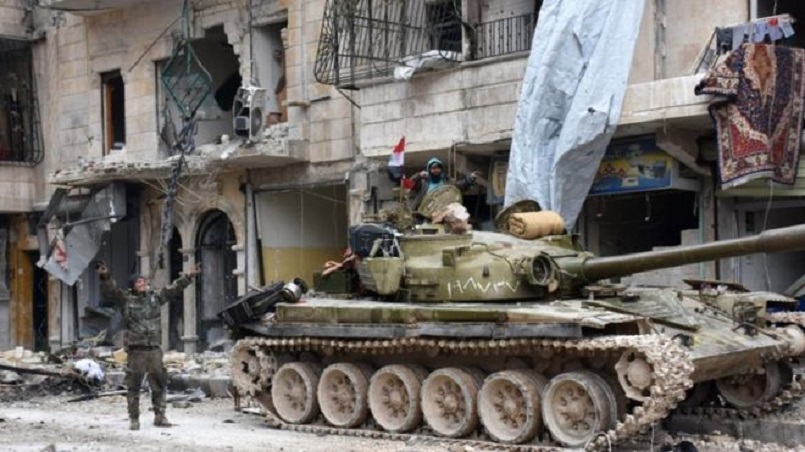
A nationwide ceasefire between Syrian government forces and rebel groups has come into effect.
The truce, brokered by Russia and Turkey, which will act as guarantors, began at midnight (22:00 GMT).
The deal includes many rebel groups but not jihadists such as the so-called Islamic State, or the Kurdish YPG.
The ceasefire appeared to be holding in most areas early on Wednesday, If it continues, peace talks are due to be held in Kazakhstan within a month.
The Syrian Observatory for Human Rights, a UK-based group monitoring the conflict, said most of the country was calm in the first few hours of the truce. However it reported a clash between rebels and government forces in Hama province.
At least 300,000 people are believed to have been killed in fighting that followed the uprising against President Bashar al-Assad in March 2011.
A further four million have sought refuge in neighbouring states or Europe.
Russia takes centre stage, by Jonathan Marcus, BBC diplomatic correspondent
If the fall of Aleppo to government forces demonstrated that Russia and its Syrian allies now hold the military initiative, then this new cease-fire deal suggests that Moscow has a good measure of the diplomatic momentum as well.
Unlike previous ceasefires, this has not come out of US and Russian bilateral spadework, but from a new understanding between Moscow and Ankara.
But this new agreement relates to only one of Syria's conflicts. It does not encompass IS or the main rebel grouping linked to al-Qaeda. Even President Putin describes the deal as fragile.
The real question may be where the Russian-Iranian military effort will focus next. The deal nonetheless marks a transitional moment in the conflict, with the US tacitly acknowledging failure in Syria and Turkey signalling to the rebels that it is Ankara's strategic interests that now take precedence.
Will the ceasefire hold?
The diplomatic noises are encouraging, and even the rebel groups involved have suggested it could succeed.
However, previous ceasefire initiatives this year quickly collapsed.
Syrian Foreign Minister Walid Muallem said there was "a real chance to reach a political settlement to end the bloodshed and establish the future of the country".
The fact that the rebels have been losing ground may help.
The High Negotiations Committee (HNC), the umbrella group representing Syria's political and armed opposition factions, admitted on Thursday that because of the rebels' limited resources, it was "not possible to continue" the fight.
Who is included in the deal?
On the one side, Syrian government forces, allied factions and the Russian military.
On the other, the Free Syrian Army (FSA), a loose alliance of moderate rebel factions, plus other groups under the HNC.
The Russian defence ministry listed seven of the main rebel groups included in the truce as Faylaq al-Sham; Ahrar al-Sham; Jaysh al-Islam; Thuwwar Ahl al-Sham; Jaysh al-Mujahidin; Jaysh Idlib and al-Jabhah al-Shamiyah.
Ahrar al-Sham and Jaysh al-Islam (Army of Islam) are the key names, neither of them part of the FSA.
However, reflecting the confusion of the Syrian conflict, Reuters later quoted one spokesman for Ahrar al-Sham as saying that the group had reservations and had not signed the deal.
Who is not included?
Jihadists. So-called Islamic State (IS) "and the groups affiliated to them" are not part of the agreement, Syria's army confirmed.
It also said Jabhat Fateh al-Sham (formerly the Nusra Front) was excluded. However, some rebel officials told Reuters it was included in the deal, giving a hint of the complications that lie ahead.
This is because JFS is intrinsically linked, in Idlib province, to groups that have signed up to the truce.
The FSA also said that the deal did not include the Kurdish Popular Protection Units (YPG).
The YPG, along with other Kurdish militias, controls a large area of northern Syria up the Turkish border. It is regarded by Turkey as a terrorist organisation and an extension of the banned Kurdistan Workers' Party (PKK).
What are the terms of the deal and where does it cover?
It is nominally nationwide, although that really only covers the areas where the sides who have signed up to the truce have a presence.
Looking at the map, there are large swathes under both jihadist and Kurdish control.
One area that is included is the rebel-held area of Ghouta in eastern Damascus, where government forces have been advancing in recent months.
Announcing the deal in Moscow, Mr Putin said there were three key points:
- Ceasefire between the two sides
- Measures for overseeing the truce
- An agreement to start peace talks
Under the terms of the deal, the peace talks would begin within a month of the ceasefire taking effect - and holding - and would be held in the capital of Kazakhstan, Astana.
